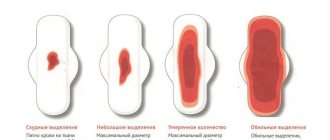Professor of the Department of Obstetrics and Gynecology No. 1 of the First Moscow State Medical University named after. I. M. Sechenova, Doctor of Medical Sciences, doctor of the highest qualification category.
Sphere of professional interests: diseases of the cervix; sexually transmitted infections; uterine fibroids; endometriosis; adenomyosis; endometrial hyperplasia; prediction and prevention of uterine cancer; infertility; preparation for pregnancy; early miscarriages; Ultrasound; ECO.
Telephone number for making an appointment.
The abolition of birth control pills must follow certain rules. When you refuse contraceptive treatment, a variety of adverse reactions occur. To ensure that these phenomena occur in a mild form, you should take into account all the recommendations of a specialist.
Rules for canceling COCs
When visiting a gynecologist, many patients complain that they are afraid of the consequences of discontinuing the contraceptive. In fact, with the right approach, you can stop taking pills without fear for your health. To do this, you must follow certain rules:
- Before stopping use of COCs, be sure to consult with a qualified healthcare professional. There are situations when refusal of hormonal contraceptives leads to a deterioration in women's health (if birth control pills were prescribed for therapeutic purposes).
- You need to stop taking the contraceptive when the last pill in the blister is gone. If there are no indications for emergency discontinuation of the drug, you should finish the package to the end, strictly observing the interval between tablets (24 hours). It should be remembered that abruptly stopping the contraceptive in the middle of the cycle can become a great overstrain for the reproductive system. After such withdrawal, heavy bleeding often begins.
How to properly stop taking hormonal contraceptives?
Many women are very afraid of the consequences of stopping birth control pills and, despite the discomfort and desire to quit, continue to buy new packages of the drug.
As a rule, it is best to discontinue hormonal oral contraceptives after finishing taking the last pill from the pack, after which the woman should begin menstrual-like bleeding, or so-called withdrawal bleeding.
In order for the female body to respond as painlessly as possible to the withdrawal of drug treatment, certain rules should be followed:
- Be sure to consult with a gynecologist (there are situations when canceling treatment is strictly contraindicated, as this will lead to a deterioration in the general condition);
- Take tests to determine the level of sex hormones in the body;
- Finishing the started pack - abruptly stopping the drug in the middle of the cycle - is a big stress for the reproductive system and the uterus will most likely react with heavy bleeding, there will be a kind of withdrawal effect.
It is important to understand that oral contraceptives are a hormonal drug and using them independently without prior examination and consultation with a doctor increases the risk of complications.
Cancellation of OK (oral contraceptives) in the middle of the cycle
Of course, it is advisable to finish the package of tablets to the end if you decide to stop using OCs and minimize negative reactions, but in some cases a woman urgently needs to stop taking it. Such situations include:
- Suspicion of pregnancy;
- Development of thrombosis;
- Detection of malignant neoplasms;
- Development of liver diseases;
- Diabetes;
- Arterial hypertension.
Why you shouldn’t suddenly stop taking COCs
Sudden refusal of combined oral contraceptives can provoke the development of the following complications:
- Breakthrough bleeding from the genital tract.
- Spotting bloody discharge.
- Delayed menstruation.
- Menstrual irregularities in the coming months.
- Deterioration of skin and hair condition.
- Return of symptoms of the underlying disease (if COCs were prescribed for therapeutic purposes).
If birth control pills are abruptly discontinued in the first half of the cycle, an unwanted pregnancy may occur. It's simple: in the first two weeks, the woman was sexually active, trusting the contraceptive, and the drug coped with its function - exactly until the moment of discontinuation. If you stop taking COCs in the first 7-10 days after starting the package, you can trigger the maturation of the follicles. Hormones stop regularly entering the body, the gonads “wake up”, and the pituitary gland begins to work as usual - stimulating the growth of follicles, the selection of the dominant one among them, and ovulation.
It takes 6 days for follicles to mature. Sperm live in a woman's genital tract for up to 7 days. Abrupt cancellation of oral contraceptives the day after intimacy can, with some probability, lead to an unplanned pregnancy.
How does the menstrual cycle change after stopping COCs?
Usually the cycle is restored within 3 months. In the first 1-2 months after stopping taking birth control pills, periods may come with a slight delay and be scanty. There is no need to worry - this is a common condition after stopping birth control pills. After 3 months, the menstrual cycle should be restored, and then your periods will come as usual.
Similar article - What's in the bones
Most often, in the third month after stopping the contraceptive, signs of PMS return: headaches, sudden mood changes, irritability, engorgement of the mammary glands.
One of the common consequences of improper discontinuation of birth control pills is the development of amenorrhea. Menstruation does not come at all, which becomes a reason for a visit to the doctor. Gynecologists warn: after stopping taking COCs, periods may be absent for up to 1.5-2 months. This is how the body reacts to changes in hormonal levels, and this is considered a common consequence of drug withdrawal.
If menstruation is delayed:
- Take a pregnancy test or donate blood for hCG.
- If pregnancy is confirmed, contact a gynecologist. It should be remembered that when COCs are discontinued, the ovaries begin to work harder, and the likelihood of conceiving a child increases significantly.
- If pregnancy is not confirmed, you can safely wait for your period. If your period is delayed by 1.5-2 months or more, you should see a doctor. To normalize the menstrual cycle, hormonal medications and physical therapy may be prescribed.
Cancellation of contraceptives before pregnancy
Many women are concerned about the question of whether it is possible to get pregnant after stopping the OC and how long after they should plan to conceive. If a woman decides to plan a pregnancy and stops taking birth control pills, then the body needs time for the menstrual cycle to fully recover; for this you should wait 2-3 months. During the use of OCs, the ovaries were in a state of “sleep” for a long time, therefore it is recommended to wait a certain period for their physiological function to resume. Of course, conception can occur immediately after stopping the pills, but such a pregnancy will be at risk, since there is a high chance of spontaneous miscarriage due to progesterone deficiency in the expectant mother’s body.
When is conception possible after stopping OK?
Many women worry that after prolonged use of oral contraception, pregnancy becomes more difficult, but medical practice refutes this fact. On the contrary, for women with ovarian hypofunction, gynecologists prescribe the use of OCs for 2-3 months, after which they recommend planning a pregnancy, since the chances of successful conception increase significantly, in addition, the chances of conceiving twins increase. After stopping the pills and actively planning pregnancy, conception occurs safely within 3-4 months.
COC withdrawal syndrome: undesirable consequences
When a woman takes combined oral contraceptives for medicinal purposes (for the treatment of diseases of the genital organs or normalization of the menstrual cycle), withdrawal syndrome occurs against the background of a sudden refusal of the drugs. In such a situation, the patient not only returns to the previous manifestations of the disease, but also intensifies.
Most often, women are concerned about the following complaints:
- The appearance of rashes and pimples on the skin.
- Development of weakness, irritability or even persistent depression.
- Decreased libido.
- The occurrence of breakthrough uterine bleeding.
- The appearance of acyclic bleeding (outside of menstruation).
- Increased work of the sweat and sebaceous glands with the appearance of acne.
- The appearance of excessive hair growth.
- Development of headache.
- Nausea and vomiting.
If such symptoms appear, it is recommended to consult a gynecologist.
What to do if the menstrual cycle does not return?
If, after stopping COCs, your periods do not come, a logical question arises: why did they disappear? There are several reasons why they are missing:
Onset of pregnancy
Withdrawal syndrome sharply increases the likelihood of a healthy woman conceiving a child, since a kind of reboot of the reproductive system occurs. Pregnancy can occur as early as the first menstrual cycle. After fertilization occurs, the physiological disappearance of menstruation occurs.
Menstrual irregularities
If there is a sudden cessation of taking COCs, a hormonal imbalance occurs. Spotting and spotting appears, which the woman easily mistakes for menstruation. When she calculates the length of the cycle, the number of days increases to almost 50 days. After discontinuation of the drug, experts recommend that women begin counting menstruation from the first days of full-fledged bleeding.
Amenorrhea
A small proportion of women experience amenorrhea – absence of menstruation – after stopping the use of oral contraceptives. This is believed to be an adverse effect caused by the use of COCs. The cause of the phenomenon is impaired activity of the hypothalamic-pituitary system with subsequent failure of hormone production.
If amenorrhea is observed for 3 months, it is recommended to consult a women's doctor and endocrinologist to find out the cause and select a method of therapy.
Diseases of the reproductive system
Combined oral contraceptives cannot protect a woman from sexually transmitted infections (chlamydia, mycoplasmosis, gonorrhea, etc.). If inflammation begins in the reproductive organs, a disorder of the menstrual cycle occurs with a delay in menstruation. To identify an infection, you must be examined by a doctor.
Ovarian and thyroid dysfunction
With pathology of the endocrine organs, hormone production fails, which leads to a change in the cycle. It often turns out that COCs were prescribed against the background of existing problems. Taking hormonal drugs suppressed the development of the disease, but after discontinuation, rapid progression of the pathology occurred. In this situation, you cannot do without the help of a specialist.
What kind of discharge occurs when taking OK?
Although birth control medications are often used to normalize periods that are irregular (that is, several days late), they can also cause spotting or heavy bleeding that cannot be attributed to the beginning of the next cycle. As a rule, they have a different nature and volume, which makes a woman even more worried about her health. Their color can be red or brown - it depends on the type of OK.
Sometimes bleeding is a sign of normal health, since oral contraceptives lead to serious changes in the functioning of the female genital organs.
However, often strange discharge can be a sign of problems that can be solved by visiting a gynecologist.
Normal discharge
Oral contraceptives are highly effective. The drug contains hormones that stop the development of the egg. This action is considered to be interference with natural processes occurring in the body. Therefore, it is often possible to notice discharge while taking contraceptives. It is important to pay special attention to them.
If a woman is not bothered by mucous leucorrhoea, but by bloody discharge, she needs to know which of them are considered normal and do not pose a health hazard:
- Appearing cyclically. A woman may see blood in the middle of her cycle, but it does not always appear. Typically, safe bleeding lasts no more than 24 hours.
- Lasting no more than 2–3 months. It takes just this amount of time for the body to get used to hormones that are artificial. If, after its expiration, bleeding is observed again, this is a good reason to visit a gynecologist.
- Appearing within 2-3 days after the end of menstruation. They occur due to the release of residual blood from the uterus. After the end of this discharge, the woman again has the usual light smears.
- Does not cause pain. If bleeding is observed, it should occur without pain in the lower abdomen. As a rule, the appearance of itching, pain or burning is a sign of the development of infectious diseases, which should not be ignored.
If, soon after starting to take birth control pills, bleeding begins, you must make sure that they are not pathological in nature in order to exclude the development of a particular disease.
Sometimes bleeding can be noticed after completing the first pack of contraceptives if the woman has stopped taking them. This phenomenon is also considered normal if it lasts 3–5 days.
Pathological discharge
Brown discharge when taking birth control pills indicates that the effect of the drug is minimal and insufficient. In this case, a woman can become pregnant after unprotected intimacy.
If, after starting to take birth control pills, strange discharge appears, it can be considered pathological in the following cases:
- Bleeding is observed daily until the end of taking a pack of tablets. In this case, a brown daub indicates that this type of OK is not suitable. This typically occurs when contraceptives have low hormonal levels. The drug will not be able to protect a woman from unwanted conception, so it is recommended to replace OCs with more reliable ones. Until this happens, you should not enter into unprotected intimate relationships.
- Brown spotting appears due to late administration of the drug or as a result of missing tablets. Sometimes failure to follow the rules for using OCs causes a decrease in their effect and red or brown discharge. If you miss taking 2 or more capsules, the chances of conception increase several times. Therefore, it is better to read the instructions to understand how to act correctly in such a situation.
- Bleeding occurred when taking birth control pills with alcohol. Alcohol reduces the effectiveness of OCs and also leads to hormonal imbalance, so smears or light bleeding often “attack” a woman.
- The bleeding appeared as a result of taking another medication. Many drugs reduce the effect of contraceptives. The list of these medications is large, so before starting therapy, you need to ask your doctor whether this treatment can be combined with OK.
If, while taking contraceptives, you experience bleeding that lasts longer than 3 days, you need to see a doctor for an examination, because normally there shouldn’t be any.
Rebound effect
When a patient starts taking COCs, the natural function of the ovaries is inhibited, which is to prepare the female reproductive cell for fertilization. This effect occurs due to inhibition of the hypothalamic-pituitary system, which, with the help of produced hormones, controls the functioning of the ovaries. During the use of birth control pills, the activity of the sex glands is suspended, and the sensitivity of receptors to hormones increases.
If a woman stops taking combined oral contraceptives, the functioning of the reproductive system is restored and hormones are produced in large quantities. This greatly increases the possibility of full maturation and release of an egg ready for conception from the follicle. Experts compare this phenomenon with superovulation. This method is especially suitable for patients with endocrine infertility, in which dysfunction of the reproductive system does not occur due to a lack of their own sex hormones.
Gynecologists prescribe combined oral contraceptives not only to prevent unwanted pregnancy, but also for therapeutic purposes. Short-term use of COCs (3-6 months) allows you to activate the ovaries, trigger ovulation and achieve conception of a child while discontinuing the drug.
Planning a pregnancy after stopping birth control pills
A woman's ability to conceive after stopping birth control depends on many factors:
- Age: young girls have a greater chance of becoming pregnant compared to women after 30 years of age, since the restoration of the reproductive system in the latter takes longer.
- Duration of use of combined oral contraceptives: the less time a woman takes hormonal pills, the shorter the recovery period will be. Accordingly, fertilization will occur faster.
- Lack of folic acid: with long-term use of COCs, poor nutrition or existing pathology of the gastrointestinal tract, a deficiency of vitamin B9 occurs, which can interfere with conceiving a child.
Similar article - How long does it take for captopril to reduce blood pressure?
If a couple is planning a pregnancy after using birth control pills, they should definitely contact a gynecologist to diagnose the condition of women’s health and select the necessary treatment. Experts say that immediately after stopping COCs, eggs do not always mature fully. That is why before conceiving, you will need to use a barrier method for 3 months, and after the expiration of the term you will need to try to get pregnant.
Now there are many means and medications that are designed to prevent unwanted pregnancy. However, combined oral contraceptives are in particular demand among women. They are convenient to take; it is enough to take one tablet a day, at the same time.
Sometimes a woman may notice that a spot appears after stopping OK. Unnatural discharge always alarms and frightens young girls. However, you should not immediately think about the development of serious disturbances in the functioning of any body function. Let's take a closer look at why this can happen.
Reasons for stopping treatment
Cancellation of protective therapy is carried out for a variety of reasons. The need to stop using contraceptives arises in the following cases:
- conception planning;
- lack of sex life;
- mandatory break in treatment;
- the appearance of various complications;
- concomitant therapy.
The main reason for refusing contraceptives is planning to conceive. It has been found that contraceptives taken for a long time can reduce a woman's reproductive function. For pregnancy to occur, the body must restore its functioning. For this reason, doctors recommend stopping treatment six months before planning conception. During this period, side effects may occur. The doctor will help you quickly eliminate unwanted consequences and normalize the function of the reproductive system.
In some patients, the need for contraception disappears when sexual activity ceases. If there is a change of partner or the woman is left alone, it is recommended to stop taking the pills. This will give the body the opportunity to rest and recover.
You need to take the pills according to certain rules. When using this method for a long time, doctors advise taking a short break every two years. Rest is necessary to maintain the natural functioning of the ovaries. Refusal to take a break can result in cessation of ovarian function. Further chances of a quick pregnancy are reduced.
Each person has different reactions to taking medications. All birth control pills contain synthetic types of hormones. Such therapy often causes undesirable reactions from various systems. During the first three months, side effects should disappear on their own. If this does not happen, you should replace the drug with an analogue or choose another method of protection.
Refusal is also required when prescribing concomitant treatment. The detection of endocrine diseases, neoplasms of unknown etiology, and hypertension leads to the prescription of additional therapy. Many medications are incompatible with birth control pills. For this reason, the doctor selects another method of protection.
If the patient has such reasons, she should visit a specialist. The doctor will explain how the withdrawal should be carried out and what side effects may occur. Proper preparation will help a woman easily endure the recovery period.
Peculiarities
If for some reason a woman decides to stop taking oral contraceptives of the hormonal group, then she needs to know that for several months the effects will be meager and short-lived.
However, spotting after stopping OC is considered normal. Its appearance is associated with the following processes:
- There is a gradual restoration of the menstrual cycle;
- Temporary atrophic changes in the uterine mucosa are stabilized;
- The endometrium gradually acquires the previously lost ability to implant the fertilized egg;
- The composition of the vaginal microflora changes and adapts to the new environment;
- After taking mili-pili, there is a decrease in the thickness of the cervical secretion.
Gradually, while the body recovers and the hormonal balance changes, the presence of minor bleeding should not terrify the girl. But at the same time, it is also important to do pregnancy tests to exclude the possibility of conception and possible failure, which also causes bleeding.
Possible negative reactions of the body
Before stopping taking birth control pills, a woman should know what negative reactions they can cause. Birth control pills cause the following side effects:
- formation of blood clots in large vessels;
- vascular diseases;
- improper attachment of the blastocyst;
- change in cycle duration;
- resumption of diseases;
- weight gain;
- deterioration of skin quality;
- body hair growth.
While taking birth control pills, the risk of blood clots increases. Thrombophlebitis is diagnosed in 10% of patients. The disease is associated with an abnormal increase in the number of platelets. These cells capture red blood cells and form a seal in certain areas of the vascular tissue. Blood clots pose a threat to the patient’s life. To reduce the risk of such a complication, coagulation therapy is prescribed.
In some cases, an increase in blood pressure is detected. The disease causes severe narrowing of the lumen of blood vessels. Blood pressure increases, hypertension develops. Pathology can be eliminated only at the first stage of its development. Doctors carry out special measures aimed at normalizing the elasticity and patency of vascular tissue.
Some women experience ectopic pregnancy after stopping the drug. Cancellation may cause a rebound effect. The effect causes a sharp increase in the work of the ovaries. They begin to actively produce germ cells. With unprotected contact, fertilization can occur before entering the fallopian tubes. In this case, the fertilized egg is attached to the walls of the tube. The pathology is dangerous due to the loss of a woman’s reproductive abilities.
Other reactions
A healthy woman has a constant menstrual cycle. The contraceptive helps to achieve a length of 28 days. Many patients, after discontinuation, experience a side effect such as a change in cycle duration.
It may vary in length over the course of several months. This is due to the restoration of the hormonal system. After the background has stabilized, the cycle is restored. If the normal duration does not return, you should visit a medical center.
A common reason for prescribing birth control pills is not only to prevent pregnancy, but also to eliminate a variety of diseases of the reproductive organs. For fibroid lesions and changes in the quality of the endometrium, short-term therapy with barrier drugs is used. After withdrawal, the disease may return in some women. In such cases, the selection of another type of treatment is required.
Completing the course
If there is spotting after discontinuation of contraceptives, then this condition is considered a normal and natural restructuring of the body. Moreover, discharge of this type can be observed for several months. This is due to how quickly the hormonal balance disturbed during the use of COCs will be restored.
The danger is caused by very heavy bleeding. In this case, you must definitely go for a consultation and examination with a gynecologist. At the end of the contraceptive course, when a woman stops taking the drug, secretion of this type should occur after about 1-2 days.
The daub should not cause any discomfort. But a woman is recommended to pay attention to the characteristics of the biological fluid. There should be no purulent discharge with an unpleasant odor; a condition in which the discharge has an unpleasant odor or is accompanied by itching and burning in the intimate area is considered pathological.
Recovery
Almost every second woman who is protected from unwanted pregnancy by taking oral hormonal contraceptives has discharge mixed with blood after stopping the medication. Ideally, such a symptom should disappear after 10-14 days.
However, the recovery period may be significantly longer due to several factors. First of all, its duration is influenced by the woman’s age. The older the patient who took the medication, the longer she will have bleeding after discontinuation.
The duration of contraception also plays an important role. If a girl has been taking the pills for only a few months, then the hormonal levels are restored faster and the spotting goes away faster. However, with long-term use of drugs, over several years, destabilization of the body can be observed even 12 months after discontinuation.
«>









